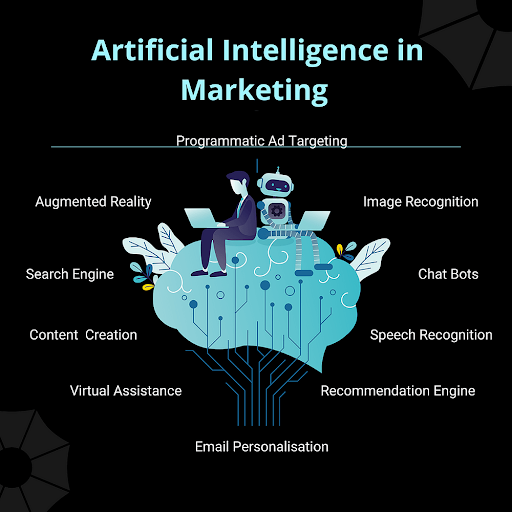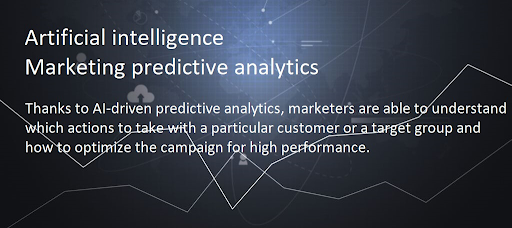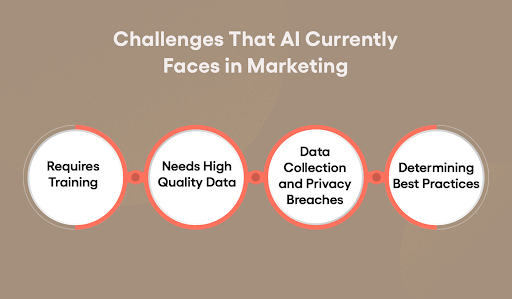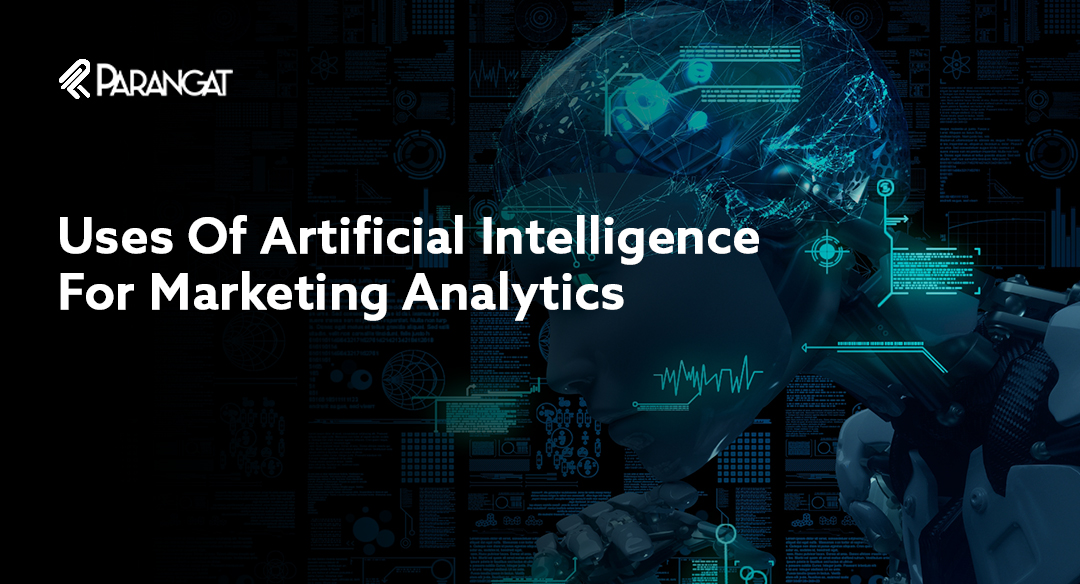Artificial intelligence (AI) is revolutionizing the field of marketing analytics, providing powerful tools and insights for businesses. By leveraging AI, marketers can analyze vast amounts of data, uncover valuable patterns and trends, and make data-driven decisions to optimize their marketing strategies.
In this article, we will explore the various applications of artificial intelligence for marketing analytics and delve into the future potential of this technology.

What Is AI In Marketing Analytics?
AI in marketing analytics refers to the use of artificial intelligence technologies and algorithms to analyze and derive insights from marketing data. It involves applying machine learning, natural language processing, and other AI techniques to process large volumes of data and uncover meaningful patterns, trends, and customer behaviors. Here are some critical importance of AI in marketing analytics:
- Data Analysis and Insights: AI enables advanced data analysis techniques, allowing marketers to extract valuable insights from diverse data sources, including customer interactions, social media, and online behavior.
- Personalization and Targeting: AI helps marketers deliver personalized and targeted marketing messages by analyzing customer preferences, interests, and behaviors.
- Customer Segmentation: AI can segment customers into distinct groups based on their characteristics and behaviors, enabling more targeted marketing campaigns and tailored experiences.
- Predictive Analytics: AI algorithms can forecast future trends, customer behavior, and campaign performance, empowering marketers to make data-driven decisions and optimize marketing strategies.
- Automation and Efficiency: AI automates repetitive tasks, such as data processing and campaign optimization, saving time and resources while improving overall efficiency.
- Real-time Marketing Insights: AI-powered analytics provide real-time insights, allowing marketers to respond promptly to changing market dynamics and customer preferences.
- Competitive Advantage: By leveraging AI in marketing analytics, businesses gain a competitive edge by staying ahead of trends, understanding customer needs, and delivering personalized experiences.
- Enhanced Customer Experience: AI-driven analytics help marketers identify opportunities to improve customer experience, enhance engagement, and drive customer satisfaction.
Overall, AI in marketing analytics empowers marketers to leverage data-driven insights, improve decision-making, and enhance marketing strategies to achieve better business outcomes.
Types Of Marketing Analytics
Marketing analytics involves various techniques and methodologies to extract insights from marketing data. Here are three common types:
Descriptive Analytics:
Descriptive analytics focuses on summarizing historical data to provide a clear understanding of past marketing performance. It involves data visualization, reporting, and key performance indicator (KPI) analysis. Descriptive analytics helps marketers identify patterns, trends, and correlations in their marketing data, enabling them to gain insights into customer behavior, campaign effectiveness, and overall performance.
Predictive Analytics:
Predictive analytics uses historical data and statistical modeling techniques to forecast future outcomes and trends. By analyzing past marketing data, predictive analytics algorithms can predict customer behavior, campaign success, and market dynamics. This type of analytics enables marketers to anticipate customer needs, optimize marketing campaigns, and make data-driven decisions to achieve better results.

Prescriptive Analysis:
Prescriptive analysis furthers predictive analytics by providing actionable recommendations and insights based on the predicted outcomes. It leverages advanced algorithms and machine learning techniques to suggest the best action to optimize marketing efforts. Prescriptive analysis helps marketers understand the impact of different marketing strategies, allocate resources effectively, and make informed decisions to drive better business outcomes.
These three types of marketing analytics work together to provide a comprehensive view of marketing performance, enable data-driven decision-making, and support effective marketing strategies. By leveraging descriptive, predictive, and prescriptive analytics, marketers can gain valuable insights, optimize campaigns, and drive business growth.
Best Marketing Analytics Tools
When it comes to marketing analytics, several powerful tools are available to help businesses gain insights and make data-driven decisions. Here are five top marketing analytics tools:
Google Analytics:
Google Analytics is a widely used web analytics tool that provides comprehensive insights into website traffic, user behavior, and marketing campaign performance. It offers a range of features, including audience segmentation, conversion tracking, and goal setting.
MixPanel:
MixPanel is a user analytics platform that focuses on event-based analytics. It enables businesses to track user interactions, understands user journeys, and analyze user behavior across web and mobile platforms. MixPanel offers advanced features such as funnel analysis and cohort analysis.
SEMrush:
SEMrush is a versatile marketing tool that provides comprehensive competitive analysis, keyword research, and SEO insights. It offers a range of features for tracking website rankings, analyzing backlinks, and optimizing content for search engines. SEMrush also includes advertising analytics and social media management capabilities.
Adobe Analytics:
Adobe Analytics is a robust analytics solution that helps businesses analyze customer data, measure marketing performance, and optimize customer experiences. It offers advanced features for segmentation, real-time analytics, and predictive modeling. Adobe Analytics integrates seamlessly with other Adobe Experience Cloud solutions.
Sprout Social:
Sprout Social is a social media analytics tool that helps businesses measure and optimize performance. It offers features for social media monitoring, engagement tracking, and audience insights. Sprout Social also provides publishing and scheduling capabilities, making it a comprehensive social media management platform.
These marketing analytics tools provide valuable insights, enable data-driven decision-making, and help businesses optimize their marketing strategies. Each tool offers unique features and capabilities, allowing companies to choose the one that best suits their needs and goals.
Applications Of Artificial Intelligence In Marketing Analytics
Artificial intelligence (AI) revolutionizes marketing analytics, enabling businesses to extract valuable insights and optimize their marketing strategies. Here are some critical applications of AI in marketing analytics:
Campaign Optimization:
AI algorithms can analyze vast amounts of data to optimize real-time marketing campaigns. AI can continuously monitor and adjust various campaign elements to improve targeting, messaging, and conversion rates.
Sentiment Analysis:
AI-powered sentiment analysis tools can analyze social media posts, customer reviews, and other textual data to gauge public sentiment about a brand or product. This helps businesses understand customer perceptions and sentiment trends.
Sales Forecasting:
AI algorithms can analyze historical sales data, market trends, and other relevant factors to generate accurate sales forecasts. This helps businesses plan inventory, optimize pricing strategies, and make informed business decisions.
AI-Driven Customer Insights:
AI can analyze customer data to uncover valuable insights about customer behavior, preferences, and purchase patterns. These insights enable businesses to segment their audience, personalize marketing campaigns, and improve customer targeting.
Personalized Customer Experience:
AI algorithms can analyze customer data in real-time to deliver personalized experiences. From customized product recommendations to tailored email marketing, AI helps businesses create individualized customer experiences that drive engagement and loyalty.
Content Creation:
AI technologies like natural language processing and machine learning can automate content creation processes. AI-generated content can range from personalized email subject lines to product descriptions, saving time and improving efficiency.
Chatbots:
AI-powered chatbots can engage customers, answer inquiries, and provide personalized recommendations. Chatbots can handle repetitive tasks, improve customer service, and enhance the overall customer experience.
These applications of AI in marketing analytics empower businesses to make data-driven decisions, optimize marketing efforts, and deliver personalized experiences to their customers. By harnessing the power of AI, companies can stay ahead in today’s competitive marketing landscape.
Benefits Of Artificial Intelligence In Marketing Analytics
Artificial intelligence (AI) benefits marketing analytics significantly, helping businesses gain valuable insights, improve efficiency, and enhance customer experiences. Here are some key benefits of using AI in marketing analytics:
Scalability:
AI-powered marketing analytics tools can handle large volumes of data and complex analyses, providing scalability to accommodate growing data sets and business needs. This scalability allows businesses to extract insights from vast amounts of data on time.
Better Customer ROI and Revenue Growth:
By leveraging AI in marketing analytics, businesses can optimize their marketing strategies to achieve a better return on investment (ROI) and drive revenue growth. AI algorithms can identify target customers’ patterns, preferences, and behaviors, enabling businesses to create more effective campaigns that resonate with their audience.
A study by McKinsey found that companies using AI-driven marketing technologies experienced a 3-15% increase in revenue and a sales ROI uplift of 10 to 20 percent.
Increased Efficiency and Automation:
AI automates repetitive tasks and processes, freeing marketers’ time to focus on more strategic activities. AI streamlines marketing analytics workflows by automating data collection, analysis, and reporting, allowing marketers to make data-driven decisions more efficiently.
For example: AI-powered marketing automation platforms can automatically segment customers, personalize messages, and trigger relevant campaigns based on customer behavior, leading to increased efficiency and improved customer engagement.
Improved Targeting and Personalization:
AI enables precise audience segmentation and personalized marketing efforts. By analyzing customer data and behavior, AI algorithms can identify individual preferences, allowing businesses to deliver tailored messages and offer to the right audience at the right time.
Netflix uses AI algorithms to analyze user viewing history and provide personalized recommendations, resulting in higher customer satisfaction and increased engagement.
Accurate and Relevant Insights:
AI algorithms can analyze vast amounts of data in real time, extracting accurate and relevant insights. By eliminating human bias and error, AI-driven marketing analytics provide more reliable, data-driven insights that guide decision-making.
AI-powered sentiment analysis tools can accurately analyze customer sentiments from social media posts, enabling businesses to understand public perception and feeling toward their brand.
Challenges Of Artificial Intelligence In Marketing Analytics
While artificial intelligence (AI) offers numerous advantages in marketing analytics, it also presents some challenges businesses must address. Here are the critical challenges associated with AI in marketing analytics:

Data Quality and Quantity:
AI relies on large volumes of high-quality data for accurate analysis and insights. However, many businesses face challenges acquiring and maintaining clean, relevant, and sufficient data for AI algorithms. Inaccurate or incomplete data can lead to biased or misleading analytics results.
Lack of Transparency:
AI algorithms can be complex and challenging to interpret, leading to a lack of transparency in how they arrive at certain conclusions or recommendations. This lack of transparency can make it difficult for marketers to understand and trust the outputs of AI-driven marketing analytics fully.
Privacy Concerns:
AI in marketing analytics often involves collecting and analyzing vast amounts of customer data, raising concerns about privacy and data security. Marketers must ensure compliance with privacy regulations and establish trust with customers by being transparent about data collection and usage practices.
Human Expertise:
While AI can automate many aspects of marketing analytics, human expertise is still essential in interpreting and contextualizing the results. Marketers must possess the skills to effectively use and interpret AI-generated insights and combine them with their domain knowledge to make informed decisions.
Addressing these challenges requires a strategic approach emphasizing data quality and governance, transparency in AI algorithms, robust privacy practices, and a balance between AI automation and human expertise. By overcoming these challenges, businesses can fully leverage the power of AI in marketing analytics to drive growth and deliver exceptional customer experiences.
Future Of Artificial Intelligence In Marketing Analytics
The future of artificial intelligence (AI) in marketing analytics is promising, driven by its potential to revolutionize business strategies. According to a study, 41% of marketers believe AI is essential for personalized customer experiences. In addition, a report by Market Research Future predicts that AI in the marketing market will grow from $12.80 billion in 2022 to $ 77.40 billion by 2030, indicating substantial growth and investment in the industry. As AI continues to evolve, it will empower marketers to unlock valuable insights, enhance targeting precision, and drive revenue growth through data-driven decision-making and personalized customer engagement.
Unlock The Power Of Marketing Analytics With Artificial Intelligence
This article explored the dynamic intersection of artificial intelligence and marketing analytics. We delved into the different types of marketing analytics, discussed the best tools available, and highlighted the diverse applications of AI in marketing analytics. We also examined the benefits and challenges associated with implementing AI in this field and a glimpse into the promising future of AI in marketing analytics. As businesses strive to gain a competitive edge, leveraging AI in marketing analytics is becoming increasingly crucial.
Want to revolutionize your market approach? Take the first step towards transformative marketing with our cutting-edge AI development services.

With roll up sleeves, dive in and get the job done approach, it was in the year 2010 when Sahil started Parangat Technologies. Emphasizing a healthy work culture and technology-driven company, he has successfully created a workplace where people love to work and live. He is a software engineer and a passionate blockchain enthusiast.


 +44-7511-112566
+44-7511-112566 +353-1-8079571
+353-1-8079571 +1-415-799-9792
+1-415-799-9792

